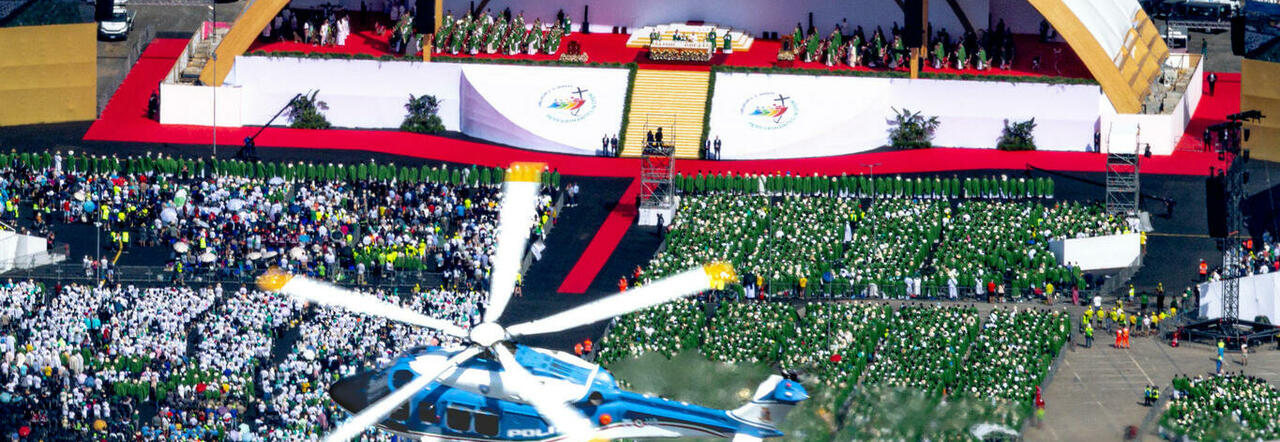A New Era for the Church: Pope Leone XIV's Approach

domenica 3 agosto 2025, 22:55
4 Minutes of Reading
The signs of change are not always easy to grasp, yet Pope Leone XIV's approach to the youth jubilee prompts reflection on a possibly different season for the Church. There was little ecclesiastical triumphalism, as the more than legitimate satisfaction of all institutions, religious and secular, for having managed a mass event with a million participants without incidents and with commendable organization, does not fall into this category. No one spoke of a show of Catholicism's strength; indeed, Monsignor Fisichella, while justly satisfied with the large attendance, reminded that according to statistics, about 70% of young people declare they do not identify with any religious faith.
Faced with this historical phase, Pope Prevost did not raise the banner of any invitation to return to a 'Christian city,' nor did he exalt the Church's ability to guide a historical transition, but chose to speak to the hearts of young people, to their difficult life experiences in a world that generates anxieties and at most offers a bit of opiates to soothe them, as he had already said in the first meeting a few days ago, recalling the bulimia induced by social media.
It has been rightly observed that in this approach, the pontiff is very 'Augustinian': like the great bishop of Hippo, he reflects on the spiritual turmoil of man, considered primarily as a singular spirit confronting the mystery of living. He does not assert that it is enough to rely on the Church and its institutions to find solution and comfort, does not preach a neatly packaged 'social doctrine' as the first point of reference, but addresses the problem of the restlessness of the human heart, which, as the great Father of the Church taught, finds its peace in God.
Is there a return to the primacy of the human situation over the social situation, of the mystery of the individual compared to the explanation of historical contradictions? One should not exaggerate in reading a specific message that will need to be framed within the complex of a pontifical magisterium that has just begun. Nevertheless, Leone XIV did not preach out of historical context and indeed recalls Gaza and Ukraine, underscores the need to be builders of peace against the return of myths of violence and wars that solve problems, and invites young people to become 'spreaders of fraternity and love,' to work for peace, to be 'the salt of the earth and the light of the world,' spreaders of hope.
But all this not by invoking a grand 'doctrine,' but by calling upon an experience, which is that need for truth that leads man to question himself. Here is the key phrase: 'Aspire to great things, to holiness, wherever you are. Do not settle for less.' Again, a message directed to the individual, to his condition in the current culture: 'The fullness of your existence does not depend on what we accumulate, nor on what we possess. It is rather linked to what we joyfully know how to welcome and share.' It is a strong message that addresses, without saying it explicitly, one of the issues that were at the basis of his election: the question of whether the Church should correct what some seemed to perceive as a drift towards becoming a large ethical-social agency, primarily subject to the demands of changing customs, to return to being the guardian proclaiming a universe of consolidated doctrines where one can automatically find more or less all possible answers.
Pope Prevost takes on this restlessness that shakes the Churches, but not to propose again the monolith of a tradition that is moreover more invented than admitted: he brings back to the center the notion of a Church 'teacher of humanity' (as John XXIII said), but perceives that this humanity challenges it once more, because, as great religious thinkers teach, not only Augustine, it is under the sign of an eternal restlessness that comes from the search for truth that no one possesses in a handbook to display on demand.
However, it should not be deduced that the Pontiff proposes to reduce everything to what, for simplicity, we might call a high individual philosophy. The search of the individual finds nourishment and support in community life, where, as we have already mentioned, the joy of welcoming and sharing can be experienced. For this reason, Leone warmly greeted the young people precisely in their 'gathering in Rome,' valuing the symbolism of both the journey to the city and the return to their homes.
Moreover, it must be recognized that in this phase where most of the great agencies of 'social mobilization' are in crisis, where the individualism of singularities seems to be dominant, where structures for the formation of new generations are lacking, the Catholic Church maintains, albeit battered, a tradition in those areas. It is said: it is more so in what was once called the so-called Third World than in the West. Perhaps, however, the climate is changing here too, slowly as always happens, and that restlessness for truth that the Pope spoke of returns somehow to the center of the complicated experiences we are living.
© ALL RIGHTS RESERVED
This article is automatically translated
This article is automatically translated
